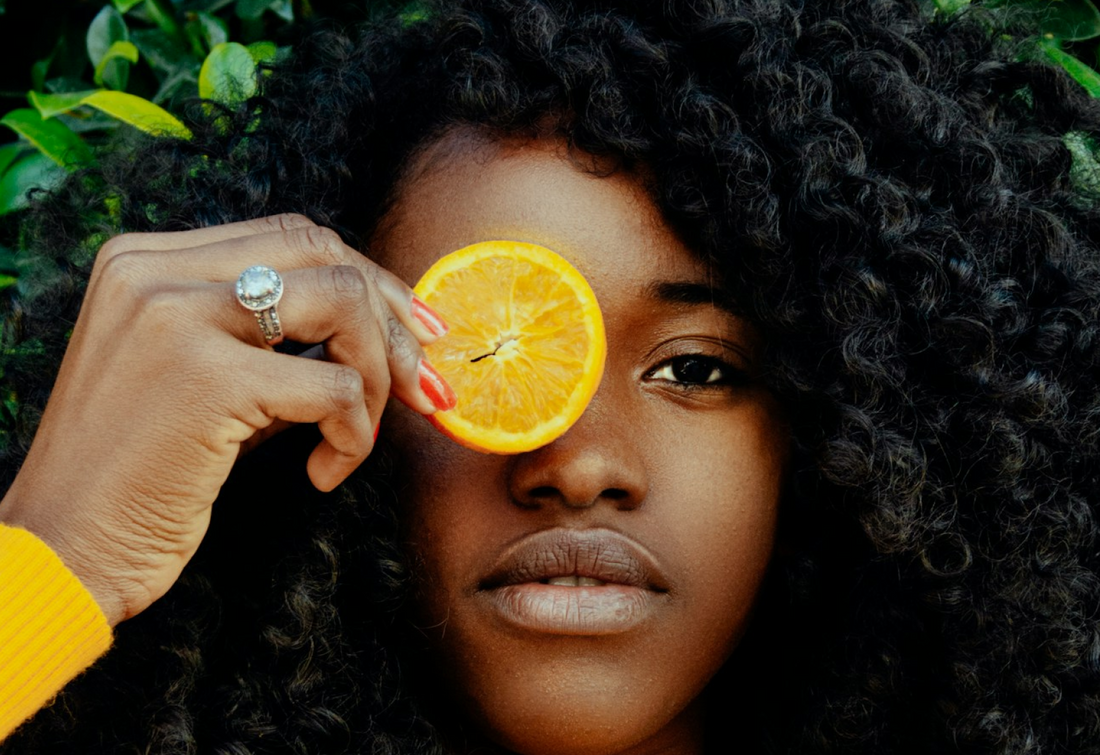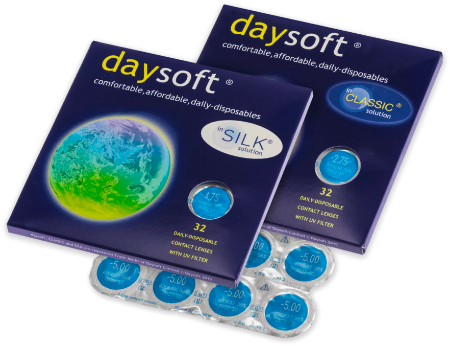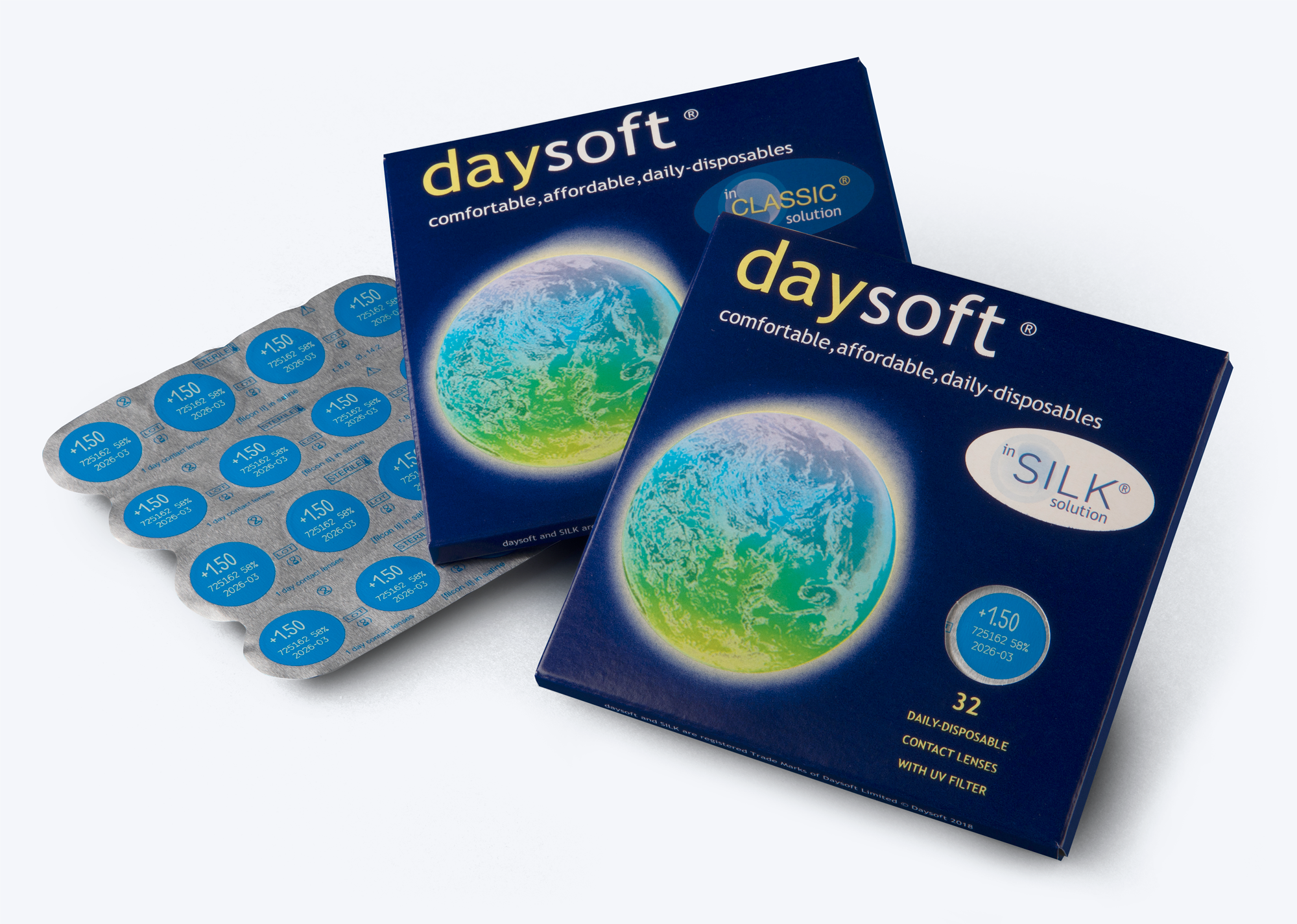Modern life is exhausting for your eyes. They work tirelessly every day, from scrolling through your phone to binge-watching your favourite series (we’ve all been there!). But are you giving them the TLC they deserve? A balanced diet packed with the right nutrients is key to keeping your vision in top shape, and high-quality eye health supplements can give that extra little support.
Whether you’re a contact lens wearer or just keen to keep your vision sharp, let’s have a look at the best vitamins for eye health and how they can keep your eyes bright and shiny.

Why eye health supplements and vitamins matter
Caring for your eyes goes beyond common misconceptions. “Eating carrots will save my eyesight”, for example, isn’t entirely true. While carrots are excellent for vision, they’re only part of the picture – a diverse range of nutrients is essential for comprehensive eye health. Similarly, the idea that supplements can replace a healthy diet is a myth. Supplements can fill nutritional gaps, but they’re no substitute for a well-balanced diet rich in whole foods. And are blue light glasses really enough to protect your eyes? While helpful, they can’t replace the critical role of proper nutrition in maintaining long-term eye health.
It doesn’t help that our busy modern lives often prioritise convenience, with ready meals and processed foods becoming a staple for many of us. While these are fine occasionally, over-reliance on them can lead to deficiencies in the vital vitamins and minerals that keep our bodies – and eyes – functioning optimally.
A cautionary tale from University of Bristol researchers highlights the stakes: a teenager who subsisted on chips, crisps and white bread suffered irreversible vision loss due to severe vitamin deficiencies. Let this be a powerful reminder – what you eat directly impacts your eyesight. While high-quality supplements can provide a much-needed boost, ensuring your eyes get the essential care they deserve when life gets busy, a nutrient-rich diet is crucial.
The best vitamins and for eye health
Let’s break down the all-stars of eye health and why they deserve a spot in your daily routine.
1 Vitamin A – the vision vitamin
Vitamin A is crucial for maintaining good vision, especially at night. It helps the eyes produce rhodopsin, a pigment that improves vision in dim light, and supports a healthy cornea while preventing dry eyes and night blindness. American Journal Of Clinical Nutrition research shows that a diet high in vitamin A can significantly reduce the risk of night vision problems.
However, it’s best to focus on plant-based sources of vitamin A, such as beta-carotene, which the body can safely convert into vitamin A as needed. Unlike supplements, which can cause harmful overdoses, plant-based foods offer a safe and effective way to meet your vitamin A needs.
The power of beta-carotene
Carrots and other deeply coloured vegetables are rich in beta-carotene, a precursor to vitamin A that supports night vision and overall eye health. A National Eye Institute study suggests that these vegetables may help preserve eyesight as we age, reducing the risk of conditions like age-related macular degeneration (AMD). To maximise absorption, pair beta-carotene-rich foods with healthy fats like olive oil or avocado.
Top foods for vitamin A:
-
Carrots
-
Sweet potatoes
-
Spinach
-
Egg yolks
-
Pumpkin
-
Dark leafy greens
-
Red peppers
-
Mango
-
Papaya
2 Vitamin C – the antioxidant hero
Vitamin C is a powerful antioxidant that shields your eyes from oxidative damage caused by free radicals. It has also been strongly linked to a reduced risk of cataracts, one of the leading causes of visual impairment worldwide. Cataracts often start developing as early as 40 and become more common after 60, but research published in the American Journal of Clinical Nutrition has shown that a diet rich in vitamin C can slow the progression of lens clouding.
 Eat the rainbow for healthy vision
Eat the rainbow for healthy vision
Fruits and vegetables are some of the best sources of vitamin C, benefitting not just your immune system but also your eye health. To protect your vision, load up on vibrantly coloured fruits and vegetables – nature’s best eye-friendly superfoods!
Top foods for vitamin C:
-
Oranges
-
Strawberries
-
Kiwi
-
Acerola cherries
-
Red bell peppers
-
Broccoli
-
Kale
-
Brussels sprouts
-
Guavas
3 Vitamin E – the protector
Vitamin E teams up with vitamin C to keep your eyes healthy and combat age-related issues. It’s especially effective against damage caused by blue light from screens, which can penetrate deep into the eyes, forming free radicals that harm cells. This damage can lead to increased sensitivity to bright light, but Frontiers in Neuroscience data shows vitamin E helps protect your eye cells, reducing sensitivity and supporting long-term vision health.
Fuel your eyes with vitamin E
Fortunately, vitamin E is found in many everyday foods. Almonds, hazelnuts, sunflower seeds and leafy greens like spinach and chard are some of the best sources. Oils such as olive oil, sunflower oil and wheat germ oil are also packed with this essential nutrient. So, whether you’re snacking on nuts or drizzling olive oil over a salad, you’re doing your eyes a favour!
Top foods for vitamin E:
-
Almonds
-
Sunflower seeds
-
Spinach
-
Avocados
-
Olive oil
-
Wheat germ oil
-
Hazelnuts
-
Chard
4 Zinc for a healthy retina
Zinc plays a vital role in keeping your retina healthy and strong. It helps transport vitamin A to the retina, where it produces a pigment essential for adapting to different light conditions and seeing in dim light. This pigment also shields the eye from light-induced damage. Age-Related Eye Disease Study Research Group data suggests that zinc not only supports the retina but may also help reduce the risk of retinal problems as we age.
Boost your zinc intake
Animal-based zinc sources include oysters, beef, pork and chicken. For plant-based options, pumpkin seeds, lentils, chickpeas, beans, oats and nuts like cashews and sesame seeds are excellent choices. Dairy products like cheese and yogurt also contribute to your daily zinc needs, keeping your eyes in top condition.
Top foodsfor zinc:
-
Oysters
-
Beef
-
Pork
-
Chicken
-
Pumpkin seeds
-
Lentils
-
Chickpeas
-
Beans
-
Oats
-
Sesame seeds
-
Cashews
-
Cheese
-
Yogurt
5 Lutein and zeaxanthin – natural eye shields
Lutein and zeaxanthin are carotenoids that act as natural sunblock for your eyes, filtering harmful blue light and reducing the risk of AMD. These powerful antioxidants protect eye tissue from free radical damage, which is a key factor in AMD. Research shows that people with higher levels of carotenoids, particularly lutein and zeaxanthin, are better protected against visual problems later in life.
Boosting your carotenoid intake
Since the body doesn’t produce lutein or zeaxanthin, it’s essential to include them in your diet. Foods like dark-green vegetables (kale and spinach), egg yolks, sweetcorn and squash are rich sources. The Centre for Vision Research at the University of Sydney found that eating two to four eggs per week can significantly lower the risk of AMD. By incorporating these carotenoid-rich foods into your meals, you can help safeguard your vision as you age.

Top foods for lutein and zeaxanthin:
-
Kale
-
Spinach
-
Egg yolks
-
Sweetcorn
-
Squash
-
Orange peppers
-
Broccoli
-
Kiwi
-
Courgette
6 Omega-3 fatty acids – the hydration helpers
Omega-3 fatty acids are essential for maintaining eye health, especially when it comes to combating dry eyes. These healthy fats work by reducing inflammation and boosting the production of tears, which helps to keep eyes moisturised and comfortable. Investigative Ophthalmology & Visual Science research shows that a diet rich in omega-3s can reduce dry eye symptoms by up to 17%, offering natural relief for this common issue.
Where to find omega-3s
Oily fish like salmon, mackerel, sardines and tuna are excellent sources of omega-3s, providing the body with the nutrients it needs for overall eye health. For those following a plant-based diet, chia seeds, flaxseeds, walnuts and hemp seeds are fantastic alternatives. Combining both animal and plant-based sources can ensure you’re getting optimal levels of this essential nutrient.
Top foods for omega-3 fatty acids:
-
Salmon
-
Mackerel
-
Sardines
-
Tuna
-
Chia seeds
-
Flaxseeds
-
Walnuts
-
Hemp seeds
How to incorporate these nutrients into your daily routine
Supporting your eye health doesn’t have to be complicated or time-consuming. Here are some simple ways to ensure your eyes get the nutrients they need:
-
Eat the rainbow: fill your plate with a variety of colourful fruits and vegetables to naturally boost your intake of vitamins and antioxidants like lutein, zeaxanthin and vitamin C.
-
Stay hydrated: drinking plenty of water keeps your eyes lubricated and reduces dryness and strain.
-
Follow the 20-20-20 rule: give your eyes regular breaks during screen time by looking 20 feet away for 20 seconds every 20 minutes. Read The Low-Down On Eyes and Screens: How To Avoid Eye Strain for more details.
Your eyes are one of your most valuable assets, so taking care of them should be a priority. Whether through diet or supplements, giving your eyes the right nutrients can help keep your vision sharp and prevent common issues down the line. Remember, it’s all about balance – eat well, supplement wisely and don’t forget those regular eye check-ups!!



